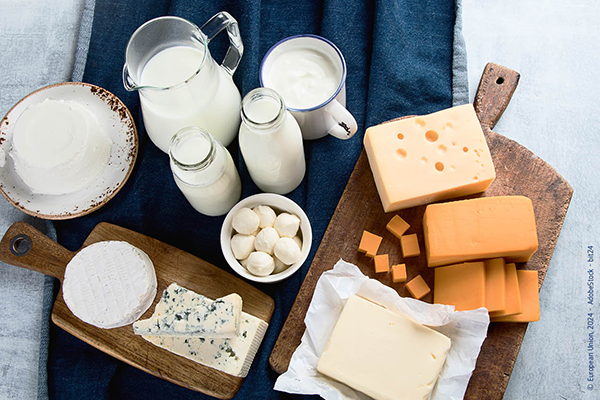Overview
The European Union is a substantial producer of milk and milk products, which are integrated in the common market organisation (CMO).
Milk production takes place in all EU countries and represents a significant proportion of the value of EU agricultural output. Total EU milk production is estimated to be around 155 million tonnes per year. The main producers are Germany, France, Poland, the Netherlands, Italy and Ireland. Together they account for more than 70% of EU milk production.
The EU dairy herd has been decreasing in recent years as the milk yield per cow has improved. In 2023 there were around 20 million cows in the EU, with an average of 7800 kg of milk produced per cow.
Farm and dairy herd sizes vary enormously, as do yields. However, as the dairy sector develops throughout the EU, variations in yield and other technical factors have been reduced; less developed dairy producers are rapidly catching up with those who had restructured and modernised first.
Market intervention
A number of mechanisms are used to protect the milk sector during times of increased market disturbance. Market intervention in particular provides a safety net in case of serious market imbalance, in the form of public intervention and aid for private storage.
Public intervention
Public intervention consists of the buying up of a good by public authorities, placing it in public storage for as long as needed, until market conditions allow for its release back on to the market. In the case of the dairy sector, public intervention is available for butter and skimmed milk powder (SMP).
Between 1 February and 30 September each year, a maximum quantity of 109,000 tonnes of SMP and 50,000 tonnes of butter complying with specific quality requirements can be offered by private operators, to be bought at a fixed price. Once these volumes are reached, intervention continues by tender until the end of the intervention period.
Public intervention stocks are sold back on the market via a tendering procedure, opened by the European Commission.
The paying agencies of EU countries are responsible for managing and ensuring control of operations linked to intervention measures in the milk and milk products sector.
Aid for private storage
Aid for private storage is another mechanism through which the EU protects the dairy sector from market disturbance. In the dairy sector, this support is available for butter, SMP and cheeses with a protected designation of origin (PDO) or protected geographical indication (PGI).
This aid supports part of the storage costs while the products are temporarily withdrawn from the market. The opening of private storage aid is not automatic (unlike public intervention), and requires the adoption of a Commission regulation.
Private storage schemes for butter and SMP usually finance storage costs for a minimum period of 90 days and a maximum of 210 days (this is defined in the Commission regulation which opens the scheme). The aid usually comprises a fixed rate per tonne, plus a daily amount per tonne.
Trade with non-EU countries
The EU is a major exporter of dairy products and is the biggest cheese and SMP exporter in the world. Dairy exports under certain quotas opened by third countries are subject to the issuing of an export licence.
Additionally, an import regime applies to the entry of dairy products into the EU. Preferential imports are subject to import licences and, in general, payment of an import duty (tariff). Several trade agreements, multilateral and bilateral, have resulted in preferential imports at reduced or zero duty, mostly in the form of import quotas.
The requirements under the export and import regimes for dairy products are laid out in Commission Delegated Regulation (EU) 2020/760 and Commission Implementing Regulation (EU) 2020/761, both of which were adopted on 17 December 2019.
Milk Package
The 'milk package' introduced in 2012 was a series of instruments to improve the supply chain in the dairy sector and to increase its resilience following the end of the quota system in 2015.
Written contracts between milk producers and processors
EU countries can make written contracts between farmers and processors compulsory and oblige milk purchasers to offer a minimum contract duration to farmers. The contracts should be made in advance of delivery and contain specific elements such as:
- price
- volume
- duration
- details of payment
- collection
- rules for force majeure.
All of these elements should be freely negotiated between the parties and farmers may refuse an offer of minimum duration in contracts.
Collective negotiation through producer organisations
Farmers can join together in producer organisations that can negotiate contracts terms collectively (within certain quantitative limits so as not to distort competition), including the price of raw milk.
Related information
Publication of the amounts of raw milk production
Rules for interbranch organisations
Specific EU rules for interbranch organisations in the milk sector allow actors in the dairy supply chain to engage in dialogue and to carry out a number of joint activities. These activities concern, among others:
- promotion
- research
- innovation
- quality improvement.
This aims to achieve greater transparency and a better understanding of production and the market.
Regulation of supply of PDO/PGI cheeses
EU countries are allowed, under certain conditions, to apply rules to regulate the supply of PDO/PGI cheeses upon the request of a producer organisation, an interbranch organisation or a PDO/PGI group. This measure is aimed at ensuring the value added and quality of cheeses with a PDO or PGI, which are particularly important for vulnerable rural regions.
This instrument is currently applied for the following cheeses:
- Asiago (IT)
- Beaufort (FR)
- Comté (FR)
- Grana Padano (IT)
- Gruyère (FR)
- Parmigiano Reggiano (IT)
- Reblochon (FR)
- Abondance (FR)
- Emmental de Savoie (FR)
- Tomme de Savoie (FR)
- Raclette de Savoie (FR).
Related information
Geographical indications and quality schemes explained
The milk package report 2016
Development of the dairy market situation and the operation of the milk package provisions
Evolution of the market situation for milk and dairy products
Legal bases
The legal bases for the EU milk and milk products sector are covered by Regulation (EU) 1308/2013 on the common organisation of the agricultural markets, and by the following regulations:
- Commission Implementing Regulation (EU) 511/2012 on the milk and milk products sector;
- Commission Delegated Regulation (EU) 880/2012 on transnational cooperation and contractual negotiations of producer organisations in the milk and milk products sector.
Exceptional measures
Exceptional ad-hoc measures can be used during periods of severe market disturbance. The legal basis for this is provided for in Articles 219 to 222 of the CMO Regulation (EU) 1308/2013.
In light of the unprecedented situation caused by the COVID-19 crisis, the Commission approved temporary derogations from EU competition rules, which were available to all farmers across EU countries. Each EU country was required to notify their uptake. France notified the implementation of these measures in its dairy sector.
Marketing standards
In addition to the marketing standards for spreadable fats, specific definitions, designations and sales descriptions apply to the following products:
Market monitoring
The EU milk market observatory provides data and information on the milk sector. It follows and analyses past and present trends at a global and European level for topics such as:
- production
- supply and demand
- production costs
- market perspectives.
Committees
Various committees, composed of government representatives and chaired by a Commission representative, meet regularly to ensure that the Commission's responsibility for adopting implementing acts is exercised under the control of EU countries.
The committee for the common organisation of the agricultural markets meets regularly to discuss areas such as the evolution of market prices, production and trade in the EU and non-EU countries.


